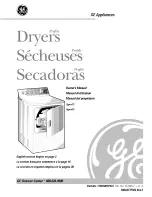
113545 - 3
Telephone 01422 822282
21
Warranty Information _________________
Returning Warranty Cards
Before any dryer leaves the factory test area, a warranty card
is placed on the inside of the main door glass. These warranty
cards are intended to serve the customer where we record
the individual installation date and warranty information to
better serve you should you file a warranty claim.
If a warranty card did not come with your dryer, contact the
JLA Warranty Department at 01422 822282.
IMPORTANT:
A separate warranty card must be completed
and returned for each individual dryer.
NOTE:
Be sure to include the installation date when
returning the warranty card(s).
Warranty
For a copy of the commercial warranty covering your particular
dryer(s), contact the distributor from whom you purchased
the equipment and request a dryer warranty form. If the
distributor cannot be contacted or is unknown, warranty
information can be obtained by contacting the JLA Warranty
Department at 01422 822282.
NOTE:
Whenever contacting the factory for warranty
information, be sure to have the dryer’s model number and
serial number available so that your inquiry can be
handled in an expeditious manner.
Routine Maintenance _________________
Cleaning
A program and/or schedule should be established for periodic
inspection, cleaning, and removal of lint from various areas
of the dryer, as well as throughout the ductwork system. The
frequency of cleaning can best be determined from
experience at each location. Maximum operating efficiency
is dependent upon proper airflow. The accumulation of lint
can restrict this airflow. If the guidelines in this section are
met, the dryer will provide many years of efficient, trouble
free, and most importantly, safe operation.
Warning
Lint from most fabrics is highly combustible. The
accumulation of lint can create a potential fire
hazard. Keep dryer area clear and free from combustible
materials, gasoline, and other flammable vapors and
liquids.
NOTE:
Suggested time intervals shown are for average
usage, which is considered 6 to 8 operational (running)
hours per day.
IMPORTANT:
Dryer produces combustible lint and must be
exhausted to the outdoors. Every 6 months, inspect the
exhaust ducting and remove any lint buildup.
Suggested Cleaning Schedule
Every Third or Fourth Load
Clean the lint screen every third or fourth load. A clogged lint
screen will cause poor dryer performance. The lint door/
drawer is located just below the loading door of the dryer.
Open the lint door/drawer, brush the lint off the lint screen,
and remove the lint. Inspect lint screen and replace if torn.
!
!
NOTE:
To remove the lint drawer from the dryer, pull
drawer out approximately halfway. Press the lint door/
drawer stop downward and pull the drawer out.
IMPORTANT:
The frequency of cleaning the lint screen
can best be determined from experience at each location.
Weekly
Clean lint accumulation from lint chamber, thermostat, and
microprocessor temperature sensor area.
Warning
To avoid the hazard of electrical shock,
discontinue electrical supply to the dryer.
90 Days
Remove lint from gas valve burner area with a dusting brush
or vacuum cleaner attachment.
Clean any lint accumulation in and around the motor(s) casing
opening.
NOTE:
To prevent damage, avoid cleaning and/or touching
ignitor/flame-probe assembly.
Every 6 Months
Inspect and remove lint accumulation in customer furnished
exhaust ductwork system and from dryer’s internal exhaust
ducting.
NOTE:
The accumulation of lint in the exhaust ductwork
can create a potential fire hazard.
Do not obstruct the flow of combustion and ventilation air.
Check back draft dampers in the exhaust ductwork.
Inspect and remove any lint accumulation, which can
cause the damper to bind or stick.
A back draft damper that is sticking partially closed can
result in slow drying and shutdown of heat circuit safety
switches or thermostats.
When cleaning the dryer cabinet(s), avoid using harsh
abrasives. A product intended for the cleaning of
appliances is recommended.
7 Days After Installation
and Every 12 Months Thereafter
A competent professional should inspect bolts, nuts, screws,
setscrews, grounding connections and nonpermanent gas
connections (unions, shutoff valves, and orifices). Belts
should be examined. Cracked or seriously frayed belts should
be replaced. Complete an operational check of controls and
valves. Complete an operational check of all safety devices
(lint door/drawer switch, door switches, sail switch, and
hi-limit thermostats).
Summary of Contents for SD20
Page 24: ...Part No 113545 3 12 18 14 ...




































